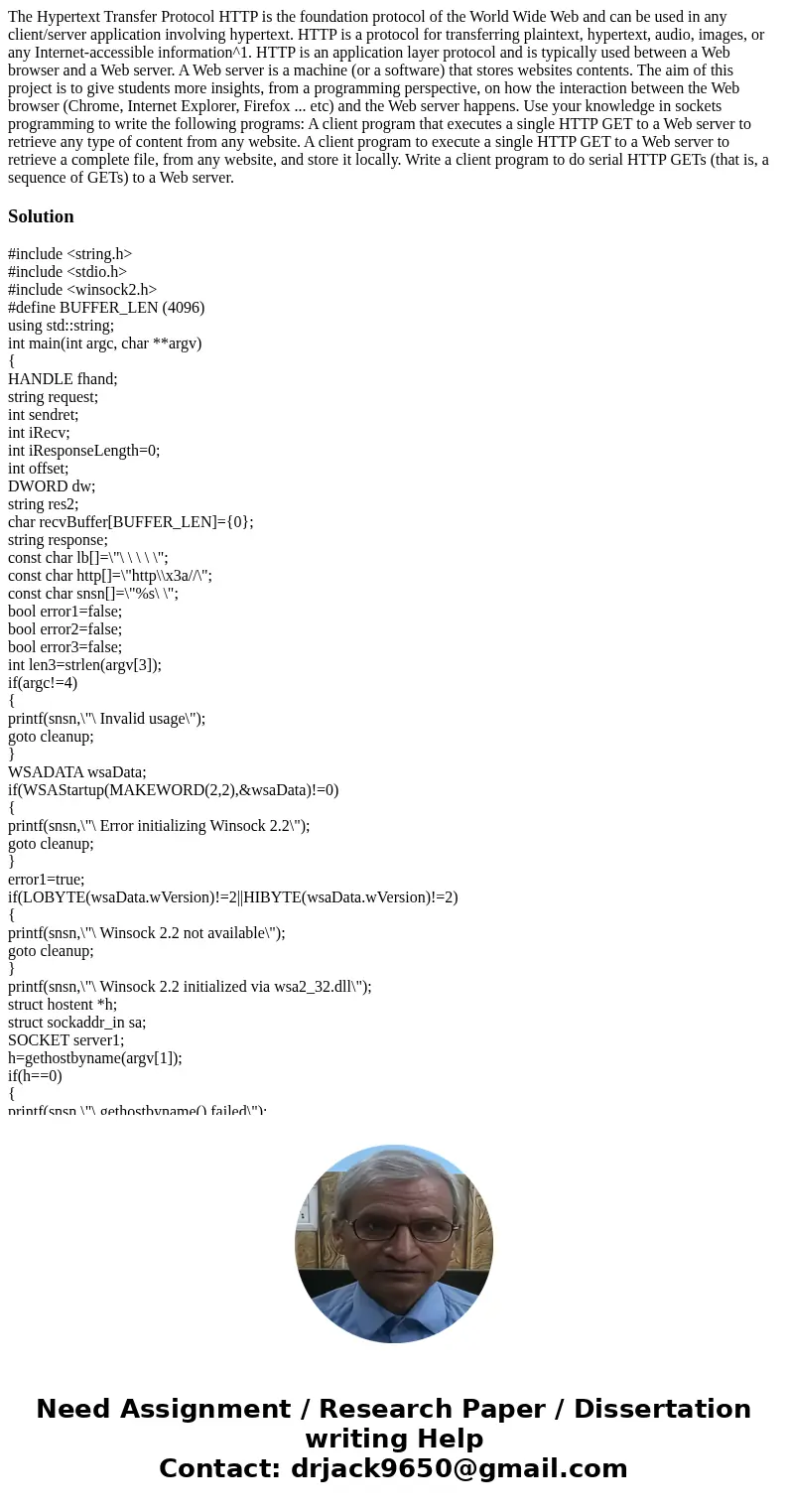The Hypertext Transfer Protocol HTTP is the foundation proto
Solution
#include <string.h>
#include <stdio.h>
#include <winsock2.h>
#define BUFFER_LEN (4096)
using std::string;
int main(int argc, char **argv)
{
HANDLE fhand;
string request;
int sendret;
int iRecv;
int iResponseLength=0;
int offset;
DWORD dw;
string res2;
char recvBuffer[BUFFER_LEN]={0};
string response;
const char lb[]=\"\ \ \ \ \";
const char http[]=\"http\\x3a//\";
const char snsn[]=\"%s\ \";
bool error1=false;
bool error2=false;
bool error3=false;
int len3=strlen(argv[3]);
if(argc!=4)
{
printf(snsn,\"\ Invalid usage\");
goto cleanup;
}
WSADATA wsaData;
if(WSAStartup(MAKEWORD(2,2),&wsaData)!=0)
{
printf(snsn,\"\ Error initializing Winsock 2.2\");
goto cleanup;
}
error1=true;
if(LOBYTE(wsaData.wVersion)!=2||HIBYTE(wsaData.wVersion)!=2)
{
printf(snsn,\"\ Winsock 2.2 not available\");
goto cleanup;
}
printf(snsn,\"\ Winsock 2.2 initialized via wsa2_32.dll\");
struct hostent *h;
struct sockaddr_in sa;
SOCKET server1;
h=gethostbyname(argv[1]);
if(h==0)
{
printf(snsn,\"\ gethostbyname() failed\");
goto cleanup;
}
printf(\"%s\",\"\ Host lookup succeeded for \");
printf(snsn,argv[1]);
memcpy((char *)&sa.sin_addr,(char *)h->h_addr,sizeof(sa.sin_addr));
sa.sin_family=h->h_addrtype;
sa.sin_port=htons(80);
server1=socket(AF_INET,SOCK_STREAM,IPPROTO_TCP);
if(server1==INVALID_SOCKET)
{
printf(snsn,\"\ socket() failed\");
goto cleanup;
}
error1=false;
error2=true;
if(connect(server1,(struct sockaddr *)&sa,sizeof(sa))<0)
{
printf(snsn,\"\ connect() failed\");
goto cleanup;
}
printf(\"%s\",\"\ Now connected to \");
printf(\"%s\",argv[1]);
printf(snsn,\" via port 80\");
request+=\"GET \";
request+=argv[2];
request+=\" HTTP/1.0\";
request+=&lb[2];
request+=\"Host: \";
request+=argv[1];
request+=lb;
printf(snsn,\"\ HTTP request constructed successfully:\ \");
printf(snsn,request.c_str());
sendret=send(server1,request.c_str(),request.length(),0);
if(sendret==-1)
{
printf(snsn,\"send() failed\");
goto cleanup;
}
printf(snsn,\"Successfully sent HTTP request to the server\");
printf(snsn,\"\ Waiting for download to complete\");
fhand=CreateFile(argv[3],GENERIC_WRITE,FILE_SHARE_READ,0,CREATE_ALWAYS,FILE_ATTRIBUTE_NORMAL,0);
if(fhand==INVALID_HANDLE_VALUE)
{
printf(snsn,\"\ CreateFile() failed\");
goto cleanup;
}
error2=false;
error3=true;
while((iRecv=recv(server1,recvBuffer,BUFFER_LEN-1,0))>0)
{
/*
char hex[5];
string packet;
packet.reserve(5*iRecv);
printf(snsn,\"\ \");
printf(\"%s\",\"Receiving \");
printf(\"%d\",iRecv);
printf(snsn,\" byte packet:\ \");
for(int i=0;i<iRecv;++i)
{
wsprintf(hex,\"%02x\",(unsigned char)recvBuffer[i]);
packet.append(hex);
printf(\"%s \",hex);
}
*/
response.append(recvBuffer,iRecv);
iResponseLength+=iRecv;
ZeroMemory(recvBuffer,BUFFER_LEN);
}
if(iRecv==SOCKET_ERROR)
{
printf(snsn,\"\ \ recv() failed\");
}
offset=response.find(lb)+4;
if(offset!=string::npos)
{
printf(\"%s\",\"\ \ File starts at offset \");
printf(\"%d\ \",offset);
printf(snsn,\"\ Initial response from server:\ \");
for(int j=0;j<offset;++j)
{
printf(\"%c\",response[j]);
}
res2.assign(response,offset,response.size());
if(WriteFile(fhand,res2.data(),res2.size(),&dw,0)==0)
{
printf(snsn,\"\ WriteFile() failed\");
goto cleanup;
}
else
{
printf(\"%s\",\"\ File successfully downloaded and saved to \");
printf(snsn,argv[3]);
}
}
cleanup:
if(error1)
{
WSACleanup();
}
if(error2)
{
WSACleanup();
closesocket(server1);
}
if(error3)
{
WSACleanup();
closesocket(server1);
CloseHandle(fhand);
}
return 0;
}



 Homework Sourse
Homework Sourse